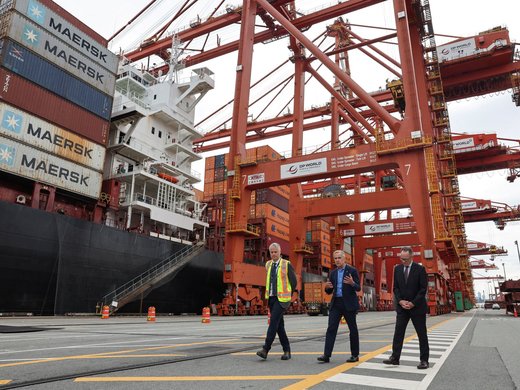Professor: Neither Hillary Clinton, Ted Cruz, Bernie Sanders nor Donald Trump fully appreciate the Trans-Pacific Partnership.
The four major presidential candidates -- Hillary Clinton, Ted Cruz, Bernie Sanders and Donald Trump -- visited Arizona in advance of the March 22 presidential primary. As expected, immigration was the principal issue, with each candidate laying out his or her widely differing view.
But they managed to come together on trade. All spoke against NAFTA and other trade agreements, particularly the Trans-Pacific Partnership recently signed by the U.S. and 11 other Pacific Rim countries. I have been voting in presidential elections since 1964, and this is the first time I can remember when all major presidential candidates were against trade liberalization.
This opposition to the TPP is both unfortunate and disappointing, because it suggests that none of the candidates recognize that the partnership is the cornerstone of not only our economic but also our political and security relationships with allies in Asia.
Why Asia matters to Arizona
Arizonans, however, know our connection to Asia is increasingly important for our local economy (improving foreign market access for agricultural and some manufactured products) and security, as we are not immune to shock waves from uncertain political relationships abroad.
The Trans-Pacific Partnership is perhaps the best opportunity the U.S. has to counter the increasing economic influence, belligerence and lawlessness of China, in Asia and elsewhere.
The TPP is a significant trade agreement, bringing together nations accounting for almost 40 percent of world GDP.
The agreement requires major trading partners such as Malaysia and Vietnam to drastically lower their tariffs, some of which approach 50 percent on U.S. manufactured-goods exports, evening the playing field for U.S. workers and products.
It also takes unprecedented steps to protect labor rights and the environment among the parties, and protects host governments from foreign investor challenges to non-discriminatory regulatory action to guard the environment and other public interest legislation.
Like most other international agreements negotiated among multiple parties, the U.S. didn't get everything it wanted in the trade partnership, but it succeeded in achieving most of its objectives resulting in a modern, high-standard agreement.
If TPP fails, our allies will go elsewhere
However, the Trans-Pacific Partnership may be more important for its political implications. Reassuring our allies in Asia that after more than a decade of preoccupation with the Middle East, we are in fact “pivoting” in their direction and remain a worthy ally in the face of growing Chinese hegemony and military activity in the region.
But the benefits of concluding the agreement negotiations could easily dissipate if Congress fails to approve the TPP promptly, because we too face competition from China.
Although our allies would much rather maintain close economic and political relations with the U.S., the next best thing is to align with China -- which is exactly what they are doing.
All seven Asian TPP parties are hedging their economic bets by concurrently negotiating a rival trade agreement spearheaded by China, the Regional Comprehensive Economic Partnership. That regional partnership could be finalized by the end of 2016, and would supplant the Trans-Pacific Partnership in setting the rules of trade and political relationships in the region if Congress does not pass the TPP soon.
The current candidate rhetoric may draw cheers on the campaign trail, but if the Trans-Pacific Partnership is seriously delayed or abandoned, it will be difficult if not impossible for our next president, whoever that may be, to fashion a credible Asia policy to protect our national interests there.


